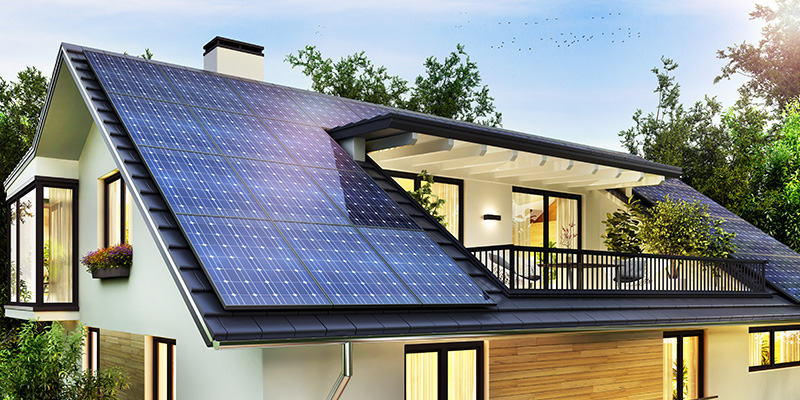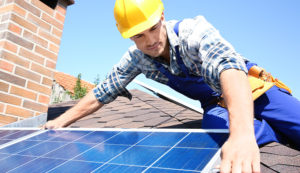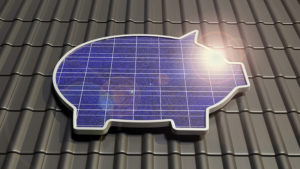Solar Panels In HOA: Installation, Guidelines And Approval

Can HOA restrict solar panels? Solar panels in HOAs pose many benefits, so more and more homeowners are installing them on their properties. But, for many, there is the question of whether or not solar panels are allowed in their communities. Here's everything homeowners and board members should know about HOA solar panels.
Browse By Category
Sign up for Our Newsletter
Can HOA restrict solar panels? Solar panels in HOAs pose many benefits, so more and more homeowners are installing them on their properties. But, for many, there is the question of whether or not solar panels are allowed in their communities. Here’s everything homeowners and board members should know about HOA solar panels.
Solar Panels in HOA Communities
Anyone who has ever lived in an HOA community knows that making property additions and alterations isn’t as straightforward. Homeowners associations have a primary goal of protecting and improving property values. These associations accomplish that by upholding specific standards regarding what homeowners can and can’t do.
A community’s Covenants, Conditions, and Restrictions (CC&Rs) outlines the obligations and rights of homeowners and the association. Restrictive covenants are legal agreements that prevent homeowners from taking a specific action.
One of the most common restrictive covenants in an HOA community concerns the exterior appearance of homeowner property. For instance, an association may prohibit homeowners from painting their houses a specific color. Covenants also restrict the addition of structures that affect the look of the property’s exterior, including pools, fences, and other structures.
Can an HOA Restrict Solar Panels?
But what about solar panels? Do HOAs have the right to ban or prohibit solar panels? The answer is not a simple yes or no. It depends on where your association is located and what laws come into play. To know whether or not your HOA can restrict solar panels in your community, you must first check state laws and then your governing documents.
Homeowner’s Right to Install Solar Panels
 Can an HOA prohibit solar panels? It depends on where you are. Nearly half of all states have enacted laws protecting homeowners’ rights to install solar panels. These laws generally prohibit HOAs from outright banning solar panels within their communities. Solar access rights can fall under one of two types: access laws and easements.
Can an HOA prohibit solar panels? It depends on where you are. Nearly half of all states have enacted laws protecting homeowners’ rights to install solar panels. These laws generally prohibit HOAs from outright banning solar panels within their communities. Solar access rights can fall under one of two types: access laws and easements.
What Are Solar Access Laws?
Solar access laws are statewide legislation prohibiting HOAs from banning or restricting solar panel installations in their community. While many states already have such laws in place, not all of them are the same. In fact, some laws include provisions for “reasonable” guidelines about solar panels in homeowners associations
Most states already have solar access laws. These regulations usually limit or restrict what HOA guidelines can include while protecting a person’s right to use solar panels.
Current States with Solar Access Laws
Here are all the states that have enacted these rules:
- Arizona: Here, state law indicates that HOAs can’t ban solar panels, but they may have reasonable restrictions or requirements.
- California: In California, the Solar Rights Act and Civil Code Section 714 protect homeowners’ rights to generate solar energy
- Colorado: The Colorado Common Interested Ownership Act was updated in 2021 to indicate that HOAs must allow solar panel installation but may impose reasonable restrictions.
- Connecticut: Solar access guidelines were added to the Connecticut Clean Air Act in 2023, but HOAs can still make reasonable restrictions and requirements.
- Delaware: Delaware Code Title 25 contains provisions that restrict an HOA’s power to enforce only reasonable restrictions, which should not cause a significant hike in prices for installing solar power systems.
- Florida: Florida Senate Statute Section 163.04 states that a person can’t be denied permission to install solar power systems. However, HOAs may still impose reasonable restrictions.
- Hawaii: Hawaii’s Energy Resources Code 196-7 protects individuals’ rights to install solar panels in their homes.
- Idaho: Idaho House Bill 158 prevents any HOA from preventing a homeowner from installing solar panels.
- Illinois: The 2021 Illinois Homeowners’ Energy Policy Statement Act prohibits HOAs from banning solar panels.
- Indiana: In Indiana, House Enrolled Act 1196 allows homeowners to petition HOAs attempting to deny installations. The state doesn’t entirely prohibit HOAs from banning solar power installation, but there are only 10 reasons for a total ban.
- Louisiana: The state’s HB 751 prohibits homeowners associations from banning solar panels.
- Maine: Under Maine’s Solar Rights, residents have the right to install solar energy collecting systems. There are reasonable restrictions when prohibiting installation is allowed, including public safety and questionable infrastructure integrity.
- Maryland: Maryland Real Property Code §2–119 protects a person’s solar access and states that HOAs may not impose restrictions that can significantly raise the price of installing solar power systems.
- Massachusetts: Massachusetts law Chapter 40A says that no by-laws or ordinances can ban a person from installing solar panels.
- Missouri: Missouri Senate Bill 820 states that HOA restrictions on solar panels are allowed within reason, but the association can’t outright ban solar panels.
- Nevada: The state’s Solar Easement and Rights Law prohibits any unreasonable ban or restriction on solar panels.
- New Jersey: Under state law, HOAs have limited power to restrict solar panel installations on residents’ properties.
- New Mexico: The state’s Solar Rights Act makes access to solar power a “property right.”
- New York: Under NY Senate Bill S4742A, HOAs can’t outright ban solar panels, nor can they impose unreasonable limitations.
- Ohio: Senate Bill 61 outlines solar access laws in the state. It prohibits HOAs from banning installations while allowing reasonable restrictions.
- Oregon: Oregon law includes statute 94.778, which considers any ban on installing solar panels void and unenforceable.
- Texas: According to Texas Property Code 202.010, HOAs can’t include provisions banning or restricting solar panel installation.
- Utah: The state’s Solar Access Code includes a guide on what reasonable restrictions HOAs can impose.
- Vermont: Vermont State Law § 544 bans any covenant or binding agreement prohibiting solar access.
- Virginia: According to Virginia Law § 55.1-1820.1, any HOA bans on solar panels are not allowed unless included in the “recorded declaration of the association.”
- Washington: The Washington Solar Rights Law bars HOAs from preventing solar panel installations that meet health and safety requirements that the state or local authorities have imposed
Solar access laws vary by state, so you must check your own laws to see what applies to your HOA.
What are Solar Easements?
This is another way for residents to protect their property’s access to sunshine.
Simply put, solar easements are legal agreements between two property owners, where one allows the other access to sunlight on another property. This agreement must be made voluntarily and documented in writing. The parties must also file it with local officials for it to be valid.
In areas where solar easements are allowed, homeowners can negotiate with other residents to protect their right to solar access while preventing possible obstructions. These may include greenery, home extensions, and other structures on other properties that cast shade on solar panels.
Similar to solar access laws, regulations about solar easements vary depending on the state or HOA community.
Federal Law and Solar Panels in HOA
Currently, there is no law on a federal level that governs how homeowners’ solar rights are protected. Nevertheless, it isn’t too far-fetched to say that one may exist.
In 2009, the American Clean Energy and Security Act was introduced, which, if it had passed, would have made it illegal to prohibit solar panel installation in HOA homes nationwide. Any HOA rules that conflicted with this would then have become unenforceable.
The act ultimately did not pass, but similar solar panel laws may be enacted in the future. Many states already have laws concerning homeowners’ associations’ solar panels today. Other states may soon follow, and federal legislation may revisit the topic depending on the political climate.
What Are Exemptions to the Rule?
Can HOA deny solar panels in specific cases?
Yes, most solar access laws have notable exceptions. For example, HOA solar panel installation can be restricted or prohibited in historic districts as structures in such areas can interfere with the neighborhood’s notable character. Other times, a historic district may require homeowners to install solar panels in a way that hides them from public view.
The exact exceptions can differ according to your location, so it is essential to be familiar with your state laws before undertaking any solar panel installations. It is worth noting that these exceptions can sometimes make the process more challenging and costly, too.
Solar Panels and HOA Rules: What Can an HOA Do?
If your state allows you to place reasonable restrictions on installing solar panels, then some things may be within your HOA’s control. A few of the restrictions that your HOA can impose include the panels’ placement, design, and installation method.
- Review Current Architectural Guidelines: To properly enforce solar panel guidelines, HOA board members must first check existing guidelines possibly outlined in the association’s governing document. Take note of current restrictions and requirements and compare them to current state law to see if they’re allowed in the state.
- Creating a New Policy: If no policy is in place, it may be time to make one as more people adopt this technology for their homes. Come up with a clear set of rules that residents must follow. Of course, you must also stay within the parameters allowed by state laws.
- Communicating HOA Solar Panel Guidelines to Residents: Communicating your HOA solar panel guidelines, if any, is imperative to all homeowners. Clearly outline the steps homeowners must take when applying for solar panel installation. What forms should they fill out? What plans or blueprints should they submit? Defining all of these early on will help your HOA streamline the procedure.
- Enforcing Architectural Guidelines Fairly: Many associations also have an application and approval process that homeowners must follow. The Architectural Review Committee usually oversees these processes, with final approval typically coming from the board. Many solar panel companies offer homeowners assistance when going through such processes.
Know the Benefits of Solar Panels in Your HOA
 Solar panels and homeowners associations may not have the smoothest relationship, especially since they can significantly alter the exterior appearance of properties. But, HOAs must understand that there are many advantages to having solar panels.
Solar panels and homeowners associations may not have the smoothest relationship, especially since they can significantly alter the exterior appearance of properties. But, HOAs must understand that there are many advantages to having solar panels.
First, there is the obvious benefit of saving on electricity costs. Sometimes, homeowners can sell back the electricity they collect to energy companies.
Secondly, solar panels come in a bevy of designs, and many are very pleasing to the eye. Associations have a common misconception that all solar panels are bulky and downright ugly. However, many experienced companies can make solar panels look stunning.
Finally, there is reason to believe solar panels can improve a home’s value. One study has shown that home value increases by $20 for every $1 saved in annual energy costs.
Common Guidelines for HOA Solar Panels
If your state allows your association to adopt solar panel rules, note that each HOA may have different requirements or guidelines. Here are some standard HOA solar panel guidelines that you may encounter.
-
Prior HOA Approval: Associations may require homeowners to obtain HOA approval for solar panels before installing them. This can involve submitting solar plan sets, specifications, and other documentation for review following HOA guidelines for solar panels.
-
Placement Restrictions. Your association may include HOA regulations indicating solar panel placements. These restrictions usually indicate the area on a person’s home where residents can install panels, like the roof or the yard.
-
Design and Aesthetics: Many HOAs impose rules to maintain consistency regarding how the neighborhood looks. This may also apply to the installation of solar panels. HOAs can set appearance requirements, such as design and color, of the solar panels that you can install. These help the HOA ensure the solar panels won’t stick out like a sore thumb.
-
Size and Number Limits: Some homeowners associations restrict the size and number of solar panels installed in a home or property. These rules usually limit the number of square feet the panels can occupy and the total capacity the system can generate.
-
Safety and Maintenance: Many HOAs impose safety and maintenance requirements for solar panels up to a certain standard. These requirements usually include regular equipment inspection, building code compliance, and proper installation.
Knowledge Is (Solar) Power
While it is clear that solar energy is a bankable trend, not all homeowners associations allow it just yet. Both homeowners and HOA board members must familiarize themselves with solar access laws that exist in their state. Additionally, you must check your association’s governing documents for any provisions relating to HOA solar panels. In doing so, both parties can stay well within the law and the community’s guidelines.
Do you have trouble understanding your governing documents? An HOA management company can help. Use our online directory today to find the best one in your area.
RELATED ARTICLES:
- Should You Live In A Deed Restricted Community?
- HOA Electric Car Charging Policy: Why Have One?
- Can Homeowners Get A Traffic Ticket In An HOA?
Trending Now
Related Article
Sign up for Our Monthly Newsletter
Sign up below for monthly updates on all HOA Resource
















